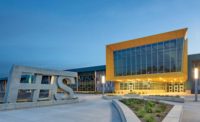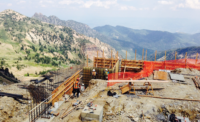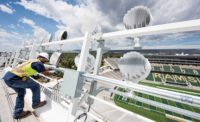Located on its namesake corner in downtown Boise, the Eighth & Main Tower is the tallest building in Idaho at 323 ft and 18 stories. But for more than two-and-a-half decades, several failed development plans left the corner a gaping hole of empty footings, exposed rebar and unfulfilled potential in the heart of the Gem State’s capital city.
Perhaps it’s fitting that Meridian, Idaho-based Engineered Structures Inc. (ESI) was the firm eventually selected to build the long-anticipated landmark, which was completed in February 2014.
“Doing that building stretched us,” says ESI CEO Thomas Hill. “It’s not every day that a new tower gets built in downtown Boise, and to have a Boise contractor do it, it did a lot as far as our reputation and image. We felt we had the people and the ability to do it, and we were successful.”
The Boise high-rise was not the sort of project the firm undertook in its early days. ESI got its start in 1973 constructing pre-engineered metal buildings for the agricultural industry in Idaho and surrounding states. But by the early ’90s, the firm, much like the Eighth & Main site, was essentially dormant, says Hill. He, along with his father, Steve, bought the firm in 1992.
“It was more or less a shell of a company; they hadn’t really been active for years,” Thomas Hill says. “We saw it as a vehicle to enter the construction field and restart an operation that had potential.”
Steady Climb
Since the purchase, ESI has been steadily realizing that potential. In 2016, the company posted companywide earnings of $433 million, with $181.6 million in revenue from Idaho projects alone. ESI moved from 241 on ENR’s national 2016 Top 400 Contractors rankings to 191 on this year’s list. Its 2016 regional revenue of $195 million places it seventh on this year’s ENR Mountain States ranking of the largest contractors in the Intermountain area.
The company is licensed in 44 states—with offices in Portland, Ore.; Salt Lake City; Amarillo, Texas; and Chantilly, Va.—and operates internationally, performing mission-critical security projects for the federal government.
But its focus remains on work in Boise’s Treasure Valley. ESI utilizes a full range of project-delivery methods working across multiple building sectors while maintaining a strong presence in retail construction.
Thomas Hill grew up working in construction in South Dakota. His father managed construction projects for national retailer ShopKo, which eventually took the family to Idaho.
“I always saw myself in construction,” says Hill, who worked in banking for four years after graduating from college in Texas. “The detour into banking was deliberate because I wanted to understand how that part of the industry works.”
Hill’s background in finance and his family’s experience in the retail sector served the company well as it expanded, says Neil Nelson, ESI president and co-owner.
“Schedule is everything for retail customers,” Nelson says. “Our motto was ‘on time, every time.’ As we kept delivering projects, word spread that we were the guys to go to. We work with all the top 10 retailers, and most of our business is in repeat work.”
Hill says retail work provided the best opportunity for growth and expansion—but also presents construction challenges. “People look at retail and think it’s just building a big box, but I would argue there are a lot of good contractors that have failed in the retail world,” he says.
“It can be more complex than it appears. Retailers are constantly changing what they do and how they do it,” Hill adds. “They always want the latest and greatest. The jobs are rarely the same and they are challenging, and we like that.”
Hill says working for retail owners and in multiple states has helped mitigate risk for the company and propel it through difficult times.
“If one part of the country is having a hard time economically, then you still have things going in other markets,” Hill says. “You also expose yourself in more markets, and it can be easier to expand into them with other projects.”
Nelson says their retail clients helped the company weather the downturn in 2008.
“We were fortunate to have very loyal employees who stuck with us, and certain clients we work for actually had upticks during that time and were doing store remodels and new outlets,” he says. “We did start self-performing more work and it wasn’t easy, but we made it through pretty well.”
Close to Home
Despite a focus on serving clients regardless of where they’re building, Nelson says firm leaders decided in about 2000 that ESI should increase its attention on projects in the Treasure Valley area.
“We like to say: ‘Everyone succeeds together,’ and for us, that means helping our community succeed too,” Nelson says. “We could see the state was going to continue to grow, and this market was underserved.”
Soon, the company was winning jobs with the area’s expanding school districts.
Brady Dickinson, superintendent of nearby Twin Falls School District, worked with ESI on two new elementary schools beginning in 2014. “They really worked to build a strong relationship with the school district and design team to accomplish the goals of the district,” Dickinson says. “The teamwork allowed us to finish our Rock Creek Elementary projects several months ahead of schedule, saving the district hundreds of thousands of taxpayer dollars.”
In addition to schools, Boise’s general office and hospitality sectors have thrived. ESI recently completed the final phase of an expansion at Boise’s convention center, in the area known as City Center Plaza. The project included construction of two office towers—a five-story and a nine-story building—as well as a 50,000-sq-ft, multimodal transportation center, built below grade.
“It was not a prerequisite to have a local company on the project, but it was important to have a company with a solid reputation and easy access to the principals of the company if we needed to,” says Patrick Rice, executive director of Boise Centre. “ESI’s reputation means something in this community. Their goal was always that of accomplishing what needed to be done as a team. We were partners, not owners versus contractors.”
Rice notes that all phases of the expansion were completed on time or ahead of schedule, and business at the convention center continued through most of the work. “The entire ESI team was professional and considerate of our staff, but most importantly, respectful and considerate of our guests. During the entire process, we had no guest complaints,” Rice says.
ESI also has done a number of corporate campus projects for Scentsy Corp. and recently competed the Inn at 500 Capitol, an 89,000-sq-ft, six-story boutique hotel in downtown Boise. It was built on a tight site with the new building constructed only 1 ft from a historic theater on one side.
Hill says having the ESI name on larger projects in the area has created more opportunities for the company. It recently launched an express construction division to focus on smaller projects and building maintenance.
“We would start to hear things like: ‘This job is too small for you guys,’ and we don’t want to hear that,” says Hill. “We didn’t see why smaller clients shouldn’t have the same quality and service we give to larger clients.”
Nelson says ESI plans to retain its focus on building and maintaining relationships with clients and producing measured, planned growth. “We don’t really look for home runs,” he says. “We’re more of a base-hit kind of company. We build relationships that lead to bigger and tougher jobs. We’ve grown organically with our customers.”









Post a comment to this article
Report Abusive Comment